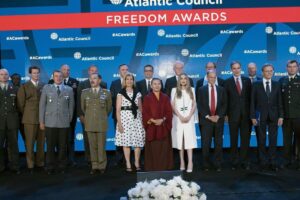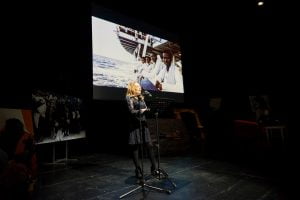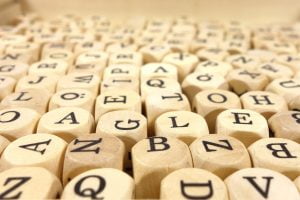Divine comes from Nigeria and he survived a terrible journey at sea on a boat that to him looked “bad, but not scary”. He was traveling with his mum and was rescued by the MOAS crew, whose members tried everything in their power to assist those on board.
Divine can fly and when he grows up, he wants to be like superman to save his mum and whoever else is in a desperate situation like him. After being brought on board, he smiled and fascinated everyone by imitating his favourite superhero: he only needs a plastic bag and a small mask to become a superhero.
His smile and his naïve, childlike dreams alone would be enough for us to stay out at sea in order to prevent the smiles and dreams of other children like him being lost to the sea, only because they were born in places where peace and happiness are far off dreams.
Even if we often forget it, peace is a goal to achieve and a status quo to safeguard: treaties, agreements, articles of national constitutions have been devoted to preventing the nightmare of war.
On the other hand, happiness appears to be a privilege, almost a luxury or something superfluous. It seems to be the exclusive prerogative of those who are born in the right place at the right time. Political instability, unemployment and the consequential worsening of the quality of life, corruption and issues related to health play an important role in the factors contributing to happiness.
On July 19th 2011 the UN General Assembly approved a resolution entitled “Happiness: Towards a holistic approach to development” and referred to the principles expressed in the Charter of the United Nations to promote economic development and social well-being for all peoples. The following year, the International Day of Happiness was proclaimed.
With a view to improving the general situation, it was decided to acknowledge “the pursuit of happiness as a fundamental human right”, and Member States were invited to submit their own proposals to recognize and value the importance of happiness and well-being as guiding principles of national policies.
But, how can we apply this right to the current migratory crisis and casualties at sea, that –beyond their smiles- often wipe out the lives of people wishing a better life?
How can we accept that millions of children at a global level are denied the right to a happy childhood, even as the same is granted to many others because they live in the right place at the right moment?
“A dream is a wish that your heart makes”… I used to sing this song as a child, I sang it to my daughter and still sing it on board to all the children we rescue.
It is not necessary to be a child to dream and be happy. It is enough to live in peace, safe from violence, far from bombs, away from persecution. It is enough not to be afraid of starving or dying because you don’t have enough water. It is enough not to be forced to see your beloved ones killed or your house burning. It is impossible to consider our happiness as a right, and the happiness of the others as a negligible chance.

“if you can dream it, you can do it” (Walt Disney)
Among the 39,000 people rescued and assisted by MOAS since its first SAR mission in 2014, we have heard the stories of many of them, telling us their dreams and expectations as well as their desire to be happy. To me this desire is no less relevant that the right to life itself.
Divine and his dream to become a superhero, despite having survived a hellish journey crossing the desert, Libya and the sea, gives me hope and I still believe in a fairer future. No child should be worried about his mum’s life, but his candid desire to save her and those in his situation gives all of us at MOAS a true motivation to intensify our presence at sea.
If we really what to implement the UN Resolution, we need both an individual and common commitment to restore the value of happiness at personal and social level. Real happiness does not humiliate or degrade other human beings, but thanks to it we can achieve a more human dimension in our lives.
None of us can be really happy if just one single person is trapped in a Libyan jail where the rule of law does not exist. None of us can be genuinely happy if adults or children are forced to board unsafe vessels in search of a better life.
In light of this, for almost one year MOAS has been actively working on the opening of safe and legal routes for those who are trapped in Libya.
This article was originally published by an Italian magazine
Please click here to read the Italian text



